RISE DIGITAL LEARNING SERIES
Leadership
Typically, when we talk about leaders, we describe people who are in formal positions of power, or "prescribed leaders." These leaders - presidents, CEOs, coaches or captains, for example - are integral in guiding their teams or companies in fulfilling their missions. But to only think of leaders as those with an official title offers a narrow view of how leadership can be defined. If we instead define leadership as simply, "the ability to influence others in the pursuit of a goal," then leaders don't need titles to lead, and can emerge given their actions and our relationships with them. Athletes, at all levels, typically fall into this category of leadership. They can be role models to others in their families, schools and communities, and can serve as peer mentors in areas where they have knowledge and experience. If equipped with the right tools, athletes can serve as leaders for important causes, such as racial equity, inclusion, and social justice.
"If your actions inspire others to dream more, learn more, do more and become more, you are a leader." — President John Quincy Adams
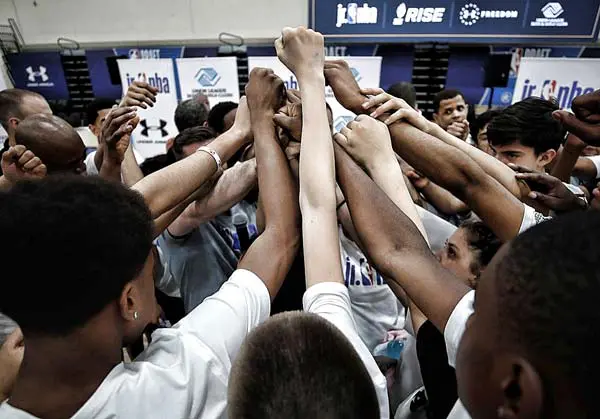
RISE Perspectives
Leaders Create Safe Spaces for Others to Flourish
By Dr. Collin Williams
My perspective on leadership was changed by a racial incident that happened to me in high school.
After taunting me in front of our peers, a classmate told me that if I were to punch him in retaliation, I would definitely be working at McDonald’s in 10 years. As the low-income Black scholarship student at an affluent, predominantly white, private school, the truth in his statement was painful, but that moment caused me to act.
I got involved in our affinity group to support students of color. I attended national diversity and leadership conferences to gain knowledge and develop the necessary skills to talk about issues of racism. And then, I co-created our high school’s first diversity club using uncomfortable conversation to create a more comfortable community.
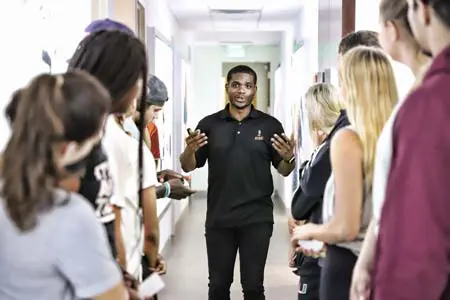
Back then, I didn't view that as leadership. I wasn't student body president or captain of the basketball team, so how could I be a leader?
I've come to realize that leadership can exist in many forms, and the key to being an effective leader for everyone is creating an inclusive culture and practicing inclusive leadership.
Imagine being tasked with putting together a cohesive team from a diverse group of people -- people of varying ages and genders, with different backgrounds from different parts of the world.
Your team has little experience working with others who may look, act or think differently from them, but you're still expected to perform at the highest level. How do you succeed? How do you create a team culture that allows everyone to feel comfortable and able to contribute, despite their differences, so that you can achieve your collective goals?
This is the challenge that many companies and campuses face on a daily basis.
The answer is creating an inclusive culture. Inclusive cultures involve and empower their constituents, promote and sustain a sense of belonging, and value and respect the talents, beliefs, and backgrounds of their members.
Because inclusive cultures allow people feel safe, they can focus on their primary goals. As a result, inclusive cultures often foster enhanced performance, engagement, attendance, collaboration, and innovation. So, how do we create these safe, inclusive cultures?
Creating inclusive cultures requires developing inclusive leaders —or leaders that assure all team members feel they are valued, are treated respectfully and fairly, have a sense of belonging, and are confident and inspired. Bourke and Espedido (2019) identified the following six traits and behaviors to distinguish inclusive leaders from others:
- Visible commitment: They articulate authentic commitment to diversity, challenge the status quo, hold others accountable and make diversity and inclusion a personal priority.
- Awareness of bias: They share their journey of recognizing and addressing personal blind spots and biases as well as flaws in the system and work hard to ensure meritocracy.
- Humility: They are modest about capabilities, ask questions, admit mistakes, and create the space for others to contribute. By sharing personal weaknesses and addressing biases, they put others at ease and enable them to share feedback and voice opinions.
- Curiosity about others: They demonstrate an open mindset and deep curiosity about others, listen without judgment, and seek to understand others’ viewpoints. They use empathy and perspective taking to establish personal connections and make it easier to make and implement shared decisions.
- Cultural intelligence: They are attentive to others’ cultures and adapt as required. They take time to learn peers’ cultural pillars and expressions, leaving them feeling heard.
- Effective collaboration: They empower others, pay attention to diversity of thinking and psychological safety, and focus on team cohesion.
The RISE glossary explains that leadership often refers to anyone who holds a formal position of power. But in our work, leadership is defined as actions that inspire others around a goal, cause or people who need assistance. Therefore, anyone can be a leader because anyone can act and inspire, regardless of an official title, role or position. The above quote by President John Quincy Adams says it well: ”If your actions inspire others to dream more, learn more, do more and become more, you are a leader.”
Because inclusive cultures inherently allow people to do and become more, the people that create those spaces are therefore leaders. All this to say, when it comes to diversity and inclusion, we could and should all be leaders.
What I experienced in my high school was something I believed no other student should have to face. I took it upon myself to make our community safer for people on the margins of wealth and whiteness.
As I was applying to colleges and focusing on my grades, AP classes, and a myriad of church-related and other extracurricular activities, it took a trusted advisor to persuade me to write my college essay on, “this other stuff,” I was doing to help create a more inclusive culture at my school. Still, it did not fully hit me until I got accepted early admission by my top choice university with more than half of my tuition covered by a leadership scholarship.
Admittedly, it took growth for me to recognize leadership was not about all the titles and roles I accumulated as a stand-out student and congregation member, but about how I used my resources to empower others.
That's what we do at RISE. We know that athletes and coaches at all levels - youth, high school, college and professional - can act as leaders in their own communities. By inspiring them to be leaders for racial equity and inclusion, they can help foster this inclusive culture, and inspire others to practice inclusive leadership wherever they might have an opportunity to influence others.
Dr. Collin Williams is RISE's Senior Director, Curriculum.
What does it take to be an effective leader?
Charles Grantham
Former Executive Director, NBPA
Hear Charles Grantham's full interview on Champions of Change: The RISE Podcast
General George Casey
Former U.S. Army Chief of Staff (retired)
Hear General Casey's full interview on Champions of Change: The RISE Podcast
NHL Senior Executive Vice President Kim Davis and Michigan Secretary of State Jocelyn Benson
Hear about the importance of inclusive leadership.
Step up to the Leadership Plate
How can you act as a leader to help create a more inclusive community?
Step up to the Leadership Plate. Download the graphic to the rightbelow, complete it and share on social media to demonstrate how you are a leader and can inspire others.
Tag us @RISEtoWIN with the #LearnToRISE.
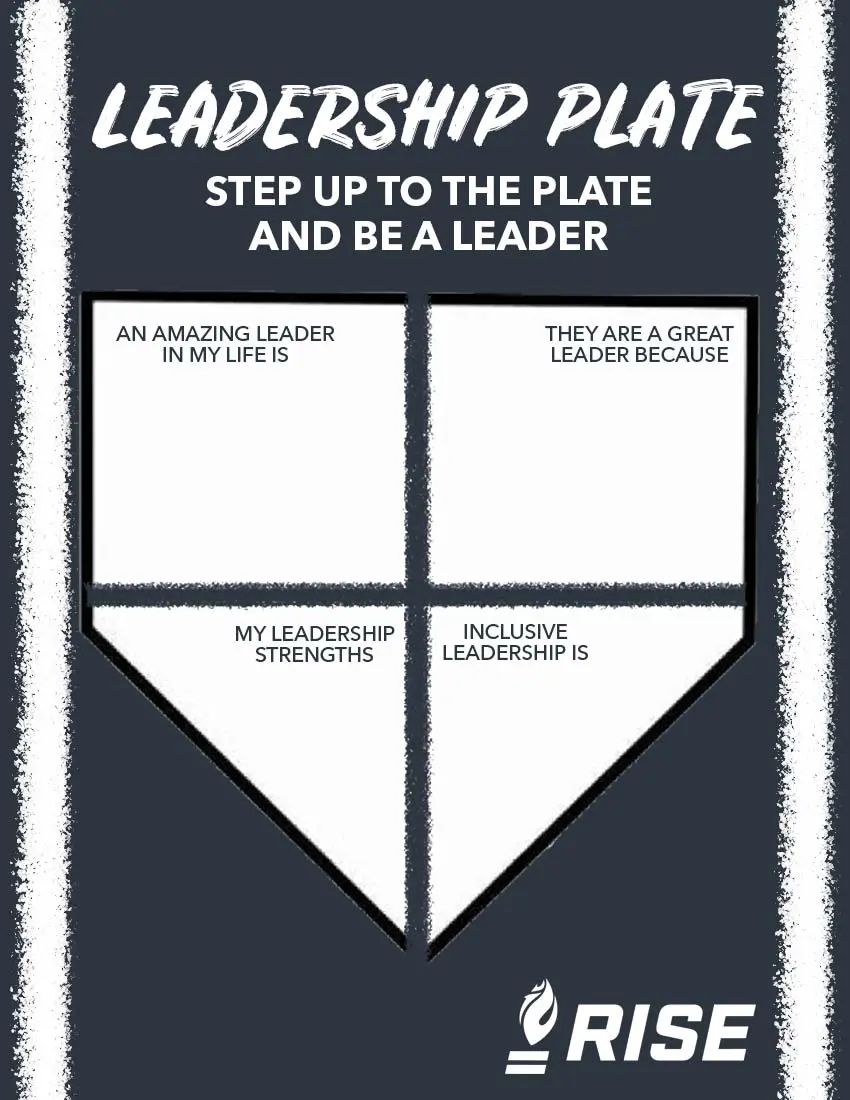
Learn More to Do More
Check out this activity on Understanding Power from RISE's curriculum. Power, like leadership, does not always come with an official title. In our own way, we each have the power and ability to influence others. Reflect on how you can use your individual power to be a leader for creating an inclusive culture and advancing racial equity.
In course 1, we defined leadership as "the ability to influence others in the pursuit of a goal." Leaders, thus, don't need titles to lead and can emerge given their actions and our relationships with them. Athletes, at all levels, can be role models to others in their families, schools and communities; can serve as peer mentors in areas where they have knowledge and experience; and if equipped with the right tools, can serve as leaders for important causes like racial equity and social justice. In course 2, we focus on the ways in which so many in the sports community have approached leadership around issues of social justice and more specifically racism. This module demonstrates the impact that leadership can have in this space. Yet simultaneously, it tells us that there is much more work to be done. Fortunately, we all have the capacity to be a leader around these issues. We need to continue moving forward and adjusting to the winds of change.
"The pessimist complains about the wind. The optimist expects it to change. The leader adjusts the sails." — John Maxwell
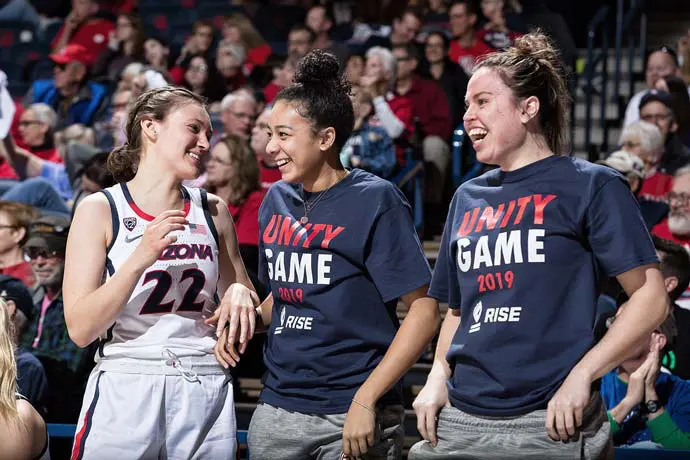
RISE Perspectives
After 5 years, RISE remains steadfast in its mission
By Paul Tagliabue, RISE Co-Chair
Several years ago, I committed to some of the most meaningful work of my life — helping to unify Americans around our shared values of fair play and equality. RISE was already established as a unique coalition of sports leagues, intercollegiate conferences and other sports organizations along with sports media companies. Since then, RISE has developed a sustainable national network of partnerships that reaches across all sports at all levels. We have implemented innovative programming to empower inclusive leadership, build bridges between law enforcement and diverse communities, and increase civic engagement. In order to add value to everything we do, we are collecting, analyzing and applying data to ensure that our programs leverage the power of sports to create a racially equitable and just society.
When the sports community came together to launch RISE to fight systemic racism, it had a different operating model as a key goal. We would not leave equity and justice to others — to view it as "their problem," not mine. We would have majority communities allied with minority communities to achieve transformative change. At that time, leaders in sport were engaged but not deeply enough and not with transformative ambitions. Now even a pandemic should not stop us from achieving our mission. Now it's clearer than ever that the sports community has exceptional platforms for bringing people together based on respect and diversity.
As a white man who held one of the highest offices in sports, I am proud of my son, daughter and grandchildren, and of the values and the leadership that they and their generations are providing to make our future better than our past. My life experiences — with my family and so many other Americans – have informed my perspective, and I believe that most Americans, in all communities and all walks of life, know that we are better when we are together. That is what led me to become the board Co-Chair at RISE.
Over the last three years, we have surveyed more than 6,200 college athletes and 1,200 coaches and athletics staff from 50 campuses to understand their perceptions of racism, social justice and athlete activism. We found an overwhelming majority believe racism is a very serious concern and that they have an obligation to act. They also want to learn how to better tackle these topics, which is where our programs help. For example, through our Big East partnership, DePaul University became the first Big East university to have every athlete registered to vote. They credited our non-partisan initiative RISE to Vote -- which has engaged more than 5,000 athletes through 70 sessions this year -- with getting them across the finish line.
Professional teams and organizations are also stepping up to create solutions. Since George Floyd's tragic and incomprehensible killing, RISE has partnered with the Minnesota Timberwolves and Lynx to support their important work in the community, including multiple Critical Conversations. We recently launched with them our award-winning Building Bridges Through Basketball program, which helps break down barriers and build trust between law enforcement diverse communities. We are bringing these programs to more communities as we have seen the life-changing impact they can have on young people and police officers.
I have deep hope and strong convictions for the future and have been inspired to see athletes at all levels working with other community leaders to fight for racial justice. For RISE and its allies, there is no crisis fatigue, and it's important we not lose sight of the critical need to eliminate bigotry and systemic racism together. As I reflect on what lies ahead for our nation and the sports community, I remain steadfast in working to unify everyone around the values of equality, dignity and respect for all that have made Americans the noble leaders that we are. I hope you will join me.
Paul Tagliabue is RISE's Co-Chair.
Inspire
Provided with among our country's biggest platforms, athletes and coaches - like these players from the Giants and Chiefs and Michigan State football coach Mel Tucker - can be influential leaders in promoting positive social change. But remember, leaders don't need to be athletes or hold positions of power, and high school student Lorenzo Bogle explains how he's committed to being a leader now after a RISE Multi-Week Leadership Program.
ACT: Civic Engagement Checklist
Nov. 3 is an important moment, but long-term change doesn't happen overnight. Civic engagement is more than voting.
Take a screenshot or download and save the image, then check the boxes you've done or plan to do and post your progress and tag us @RISEtoWIN on Twitter and Instagram.
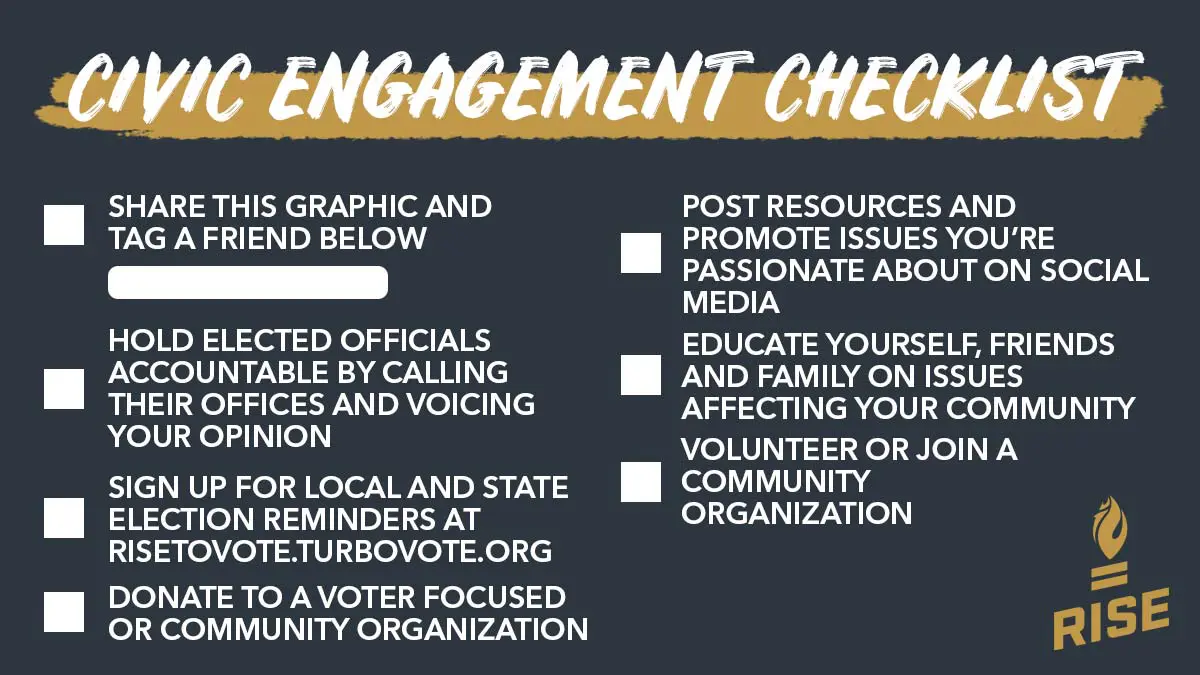





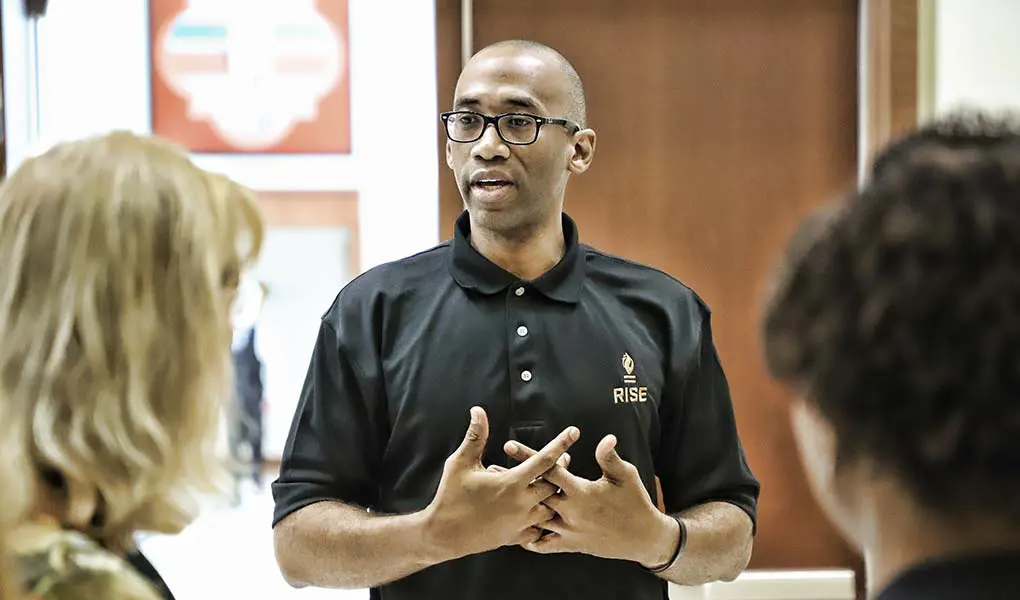
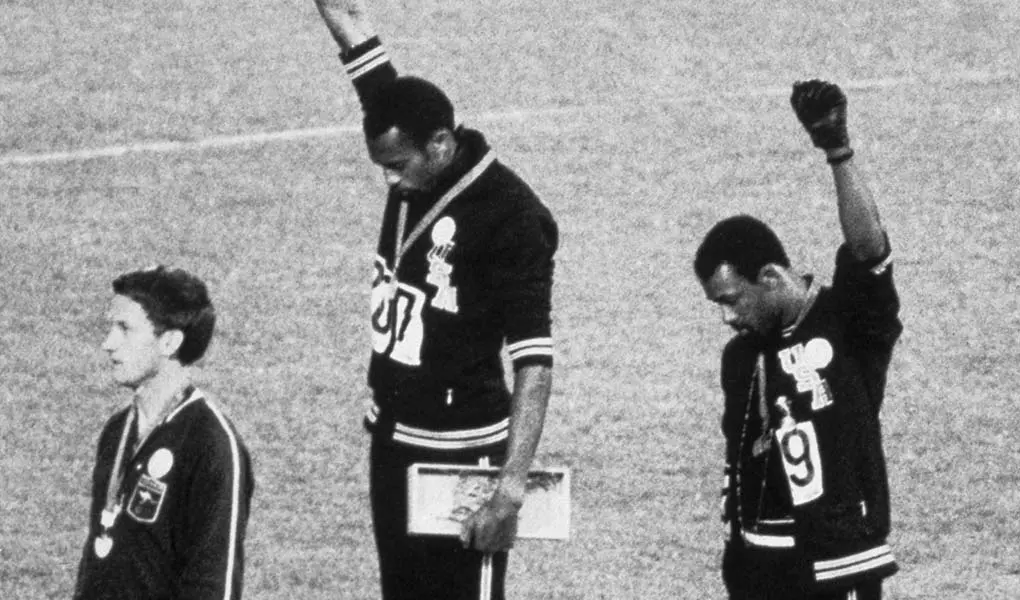
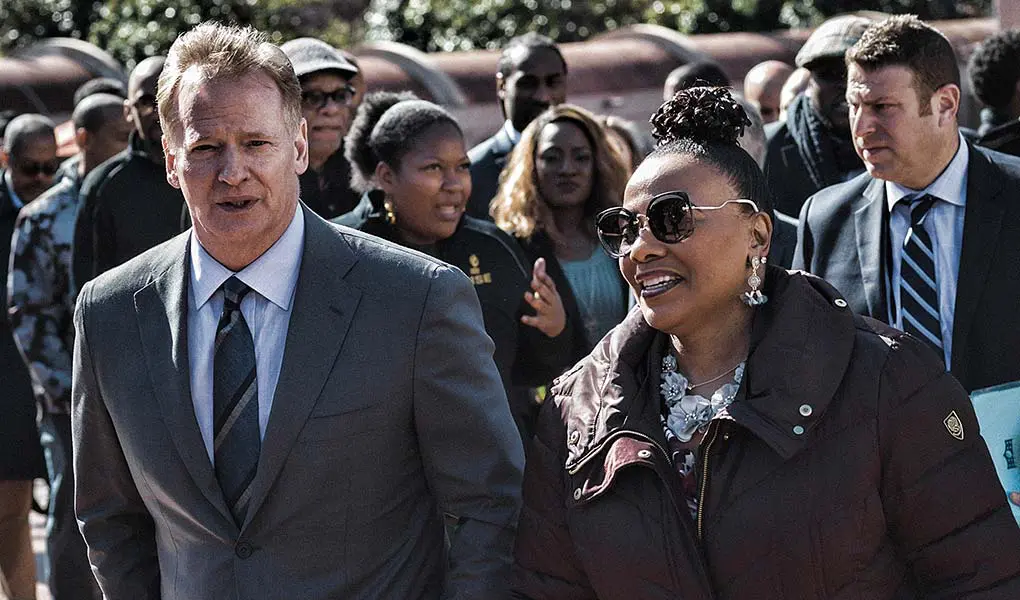
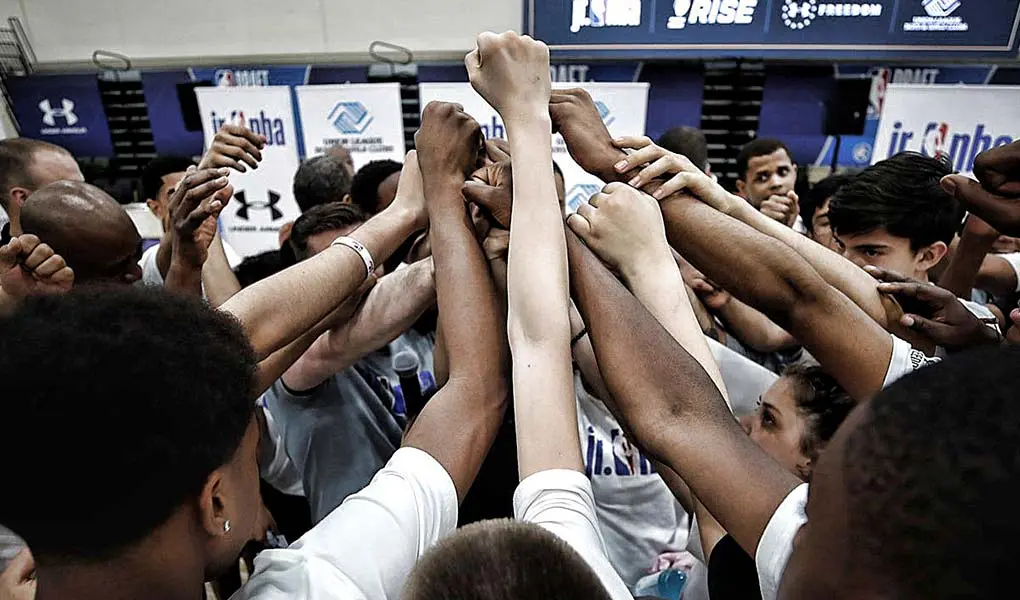
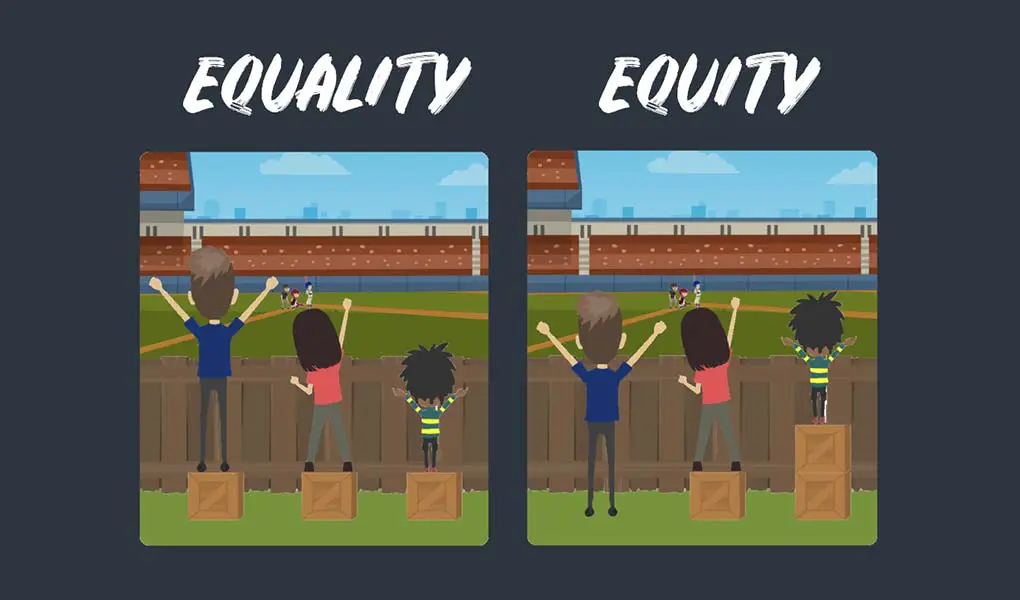
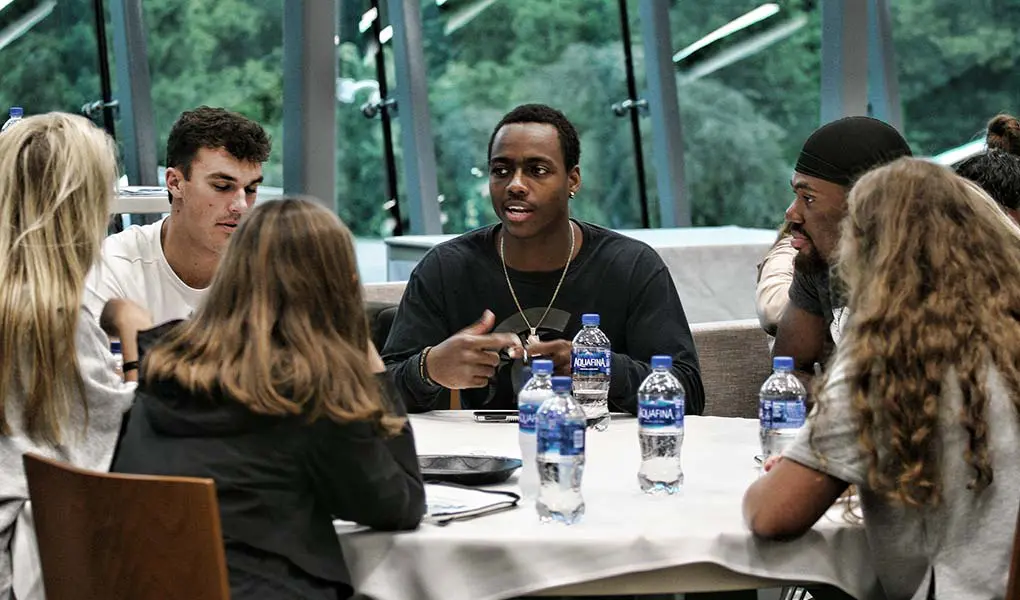
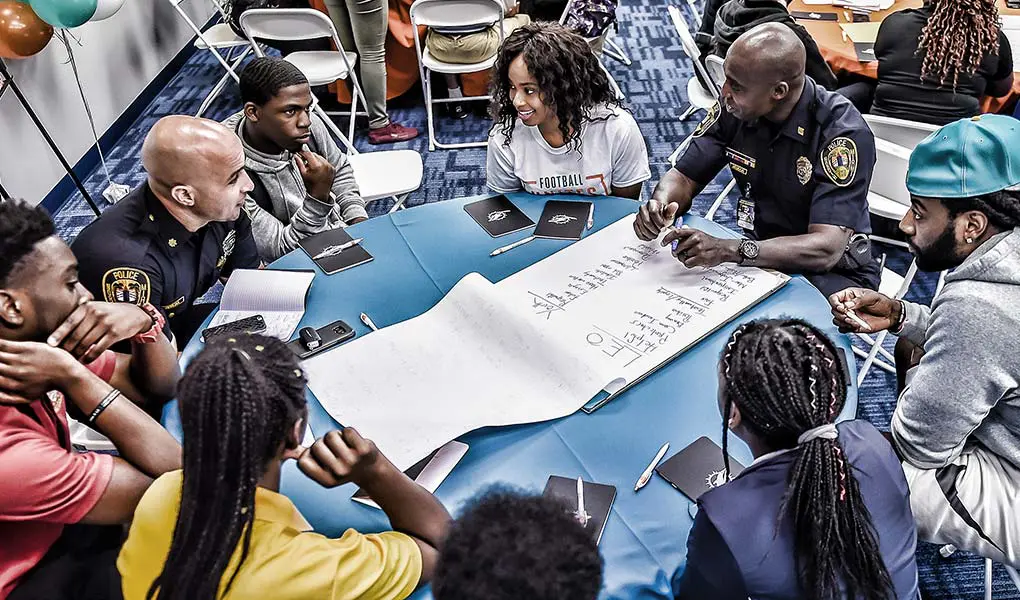
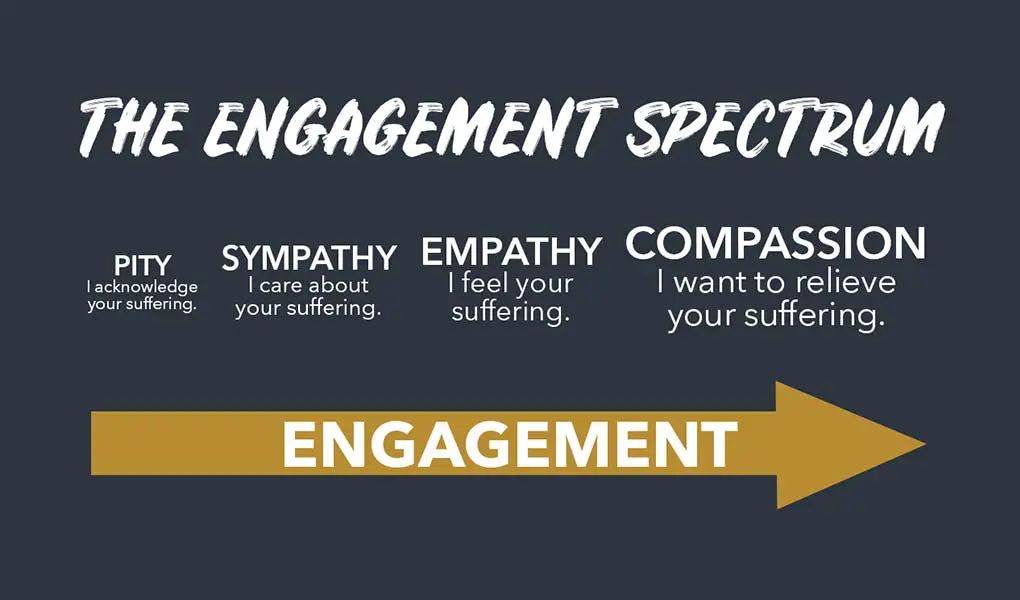
Our
Partners
Stay
In Touch
Follow us on social media.